1 Chronicles 27 meaning explained in AI Summary
This chapter details the military and administrative organization of King David's kingdom. It highlights the structured and efficient nature of his reign.
Key Points:
- Military Divisions: The chapter begins by listing twelve divisions of 24,000 men each, serving one month per year under different commanders. This system ensured a large standing army while allowing most men to tend to their fields and families for the majority of the year (verses 1-15).
- Military Leaders: Each division had a designated leader, all prominent figures within David's army. This section emphasizes the experience and loyalty of David's military leadership (verses 1-15).
- Tribal Leaders: Beyond the military, the chapter lists leaders appointed over each of the twelve tribes of Israel. These leaders were responsible for civil administration, ensuring the smooth running of daily life and justice within their respective tribes (verses 16-24).
- Overseers of Royal Property: The chapter then lists individuals responsible for managing various aspects of the king's wealth and resources, including his treasuries, livestock, vineyards, and olive groves. This demonstrates the organized and specialized nature of David's administration (verses 25-31).
- Other Key Officials: The chapter concludes by mentioning other important officials in David's court, including his chief advisors, secretary, and personal priest. This highlights the breadth and depth of David's administration (verses 32-34).
Overall Significance:
1 Chronicles 27 provides a glimpse into the sophisticated administrative and military structure established by King David. This organization was crucial for maintaining stability, prosperity, and security within his kingdom. It also underscores the significant human resources at David's disposal, reflecting the power and influence he wielded as ruler of a united Israel.
1 Chronicles 27 bible study ai commentary
The book of 1 Chronicles chapter 27 provides a detailed blueprint of King David's civil and military administration. It moves from the army's divisional structure to the tribal leaders and concludes with the royal officials and counselors. The chapter's overarching theme is divine order mirrored in national organization. By meticulously cataloging these structures, the Chronicler presents David's reign as a golden age of stability, prosperity, and readiness, offering a model of an ideal kingdom under God for the post-exilic community to emulate. It underscores that a well-ordered nation, with every part functioning in its role, reflects the wisdom of its godly leader and the blessing of God.
1 Chronicles 27 Context
This chapter is part of a larger block (chapters 23-27) detailing the organization of Israel under David. Culturally, large-scale organization and record-keeping were signs of a powerful and stable empire in the Ancient Near East. By listing military divisions, tribal governors, and economic overseers, the Chronicler demonstrates that Israel under David was not a minor hill-country kingdom but a sophisticated, well-managed state, rivaling its neighbors. This served a polemical purpose for the post-exilic audience, living as a small province under Persian rule. It reminded them of their former glory and the legitimacy of the Davidic-Zadokite system, presenting an idealized vision of what a restored Israel, unified and organized around the king and temple, could be.
1 Chronicles 27:1
This is the list of the people of Israel, the heads of fathers' houses, the commanders of thousands and hundreds, and their officers who served the king in all matters concerning the divisions that came and went, month after month throughout the year, each division numbering 24,000.
In-depth-analysis
- This verse introduces a list of military divisions, distinct from the civil administration that follows.
- Rotation System: The key feature is a monthly rotation system ("came and went, month after month"). This created a standing, trained army of 288,000 men (24,000 x 12) without the economic and social burden of a permanently mobilized force. It was an efficient "reserve" or "national guard" system.
- Word: The term "divisions" (maḥlĕqeth) is the same Hebrew word used for the priestly and Levitical divisions in chapters 24-26. This linguistic link is intentional, portraying David's organization of the military and the temple worship as parallel acts of establishing divine order in the kingdom.
- Structure: The hierarchy is clear: heads of fathers' houses > commanders > officers. This mirrors the decimal organization advised by Jethro (Ex 18:21).
Bible references
- Exodus 18:21, 25: "...appoint them as officials over thousands, hundreds, fifties and tens." (The principle of delegated, structured leadership).
- 1 Chronicles 23:6: "And David divided them into divisions..." (Parallel use of the word "divisions" for the Levites).
Cross references
1 Chr 28:1 (A summary of these officials); 2 Chr 17:12-19 (Jehoshaphat's similar military organization); 1 Ki 4:7 (Solomon's twelve governors also on a monthly rota).
1 Chronicles 27:2-15
Jashobeam the son of Zabdiel was in charge of the first division for the first month... Dodai the Ahohite was in charge of the division for the second month... Benaiah the son of Jehoiada the priest was chief in charge of the division for the third month... [and so on for all 12 months]
In-depth-analysis
This section presents the twelve divisions in a table-like format, each with its commander for one month of the year.
| Month | Commander | Noteworthy Details |
|---|---|---|
| 1st | Jashobeam son of Zabdiel | A chief of the "three" mighty men (1 Chr 11:11). |
| 2nd | Dodai the Ahohite | "Mikloth was the chief officer of his division". Dodai is likely another name for Eleazar son of Dodo, another of the "three" (2 Sam 23:9). |
| 3rd | Benaiah son of Jehoiada | A mighty warrior and later Solomon's top general (1 Ki 2:35). He commanded the king's elite bodyguard, the Cherethites and Pelethites. His role here shows his high rank even under David. |
| 4th | Asahel brother of Joab | He was killed early in David's reign (2 Sam 2:23), so his son Zebadiah succeeded him as the active commander. Listing Asahel first honors his memory and family legacy. |
| 5th | Shamhuth the Izrahite | Also known as Shammoth the Harorite (1 Chr 11:27). |
| 6th | Ira son of Ikkesh from Tekoa | Another of David's mighty men (1 Chr 11:28). |
| 7th | Helez the Pelonite | A mighty man from the tribe of Ephraim (1 Chr 11:27). |
| 8th | Sibbecai the Hushathite | Famed for killing Saph, a descendant of the giants (2 Sam 21:18; 1 Chr 20:4). |
| 9th | Abiezer the Anathothite | A mighty man from the Benjamite town of Anathoth, Jeremiah's hometown. |
| 10th | Maharai the Netophathite | Also called Mebunnai. One of the mighty men (1 Chr 11:30). |
| 11th | Benaiah the Pirathonite | Not to be confused with Benaiah son of Jehoiada. He was from Ephraim (1 Chr 11:31). |
| 12th | Heldai the Netophathite | Of the family of Othniel, Israel's first judge. Also called Heled (1 Chr 11:30). |
- Loyalty Rewarded: Nearly all commanders are drawn from the list of "mighty men" in 1 Chronicles 11 and 2 Samuel 23, showing how David rewarded the warriors who were loyal to him from the beginning.
- Integration: These men came from various tribes (Judah, Benjamin, Ephraim, etc.), demonstrating how the army unified the nation.
Bible references
- 1 Chronicles 11:10-47: "These are the chiefs of David's mighty men..." (The source list for most of these commanders).
- 2 Samuel 23:8-39: "These are the names of the mighty men whom David had..." (The parallel list of David's heroes).
- 2 Samuel 2:18-23: "...Asahel was swift of foot... Abner struck him..." (The story of the death of the 4th commander).
- 1 Kings 2:35: "...the king put Benaiah the son of Jehoiada over the army in his place." (Benaiah's ultimate promotion, foreshadowed here).
Cross references
Judg 3:9 (Othniel, ancestor of Heldai); 1 Chr 12:1-22 (Early supporters of David); 1 Sam 22:1-2 (David gathering his initial band of men).
1 Chronicles 27:16-22
Over the tribes of Israel, for the Reubenites, Eliezer the son of Zichri was chief... for the Simeonites, Shephatiah the son of Maacah... for Levi, Hashabiah the son of Kemuel; for Aaron, Zadok... [and so on for the tribes]
In-depth-analysis
- This list shifts from military leadership to civil administration, naming the prince or chief officer (nagid) for each tribe. This was the primary official linking the tribe to the central government.
- Incomplete List: The tribes of Gad and Asher are omitted, for reasons unknown. This may be due to a lost section of the source text or their lesser prominence at the time.
- Special Divisions:
- Levi/Aaron: The tribe of Levi has two representatives: one for the tribe itself (Hashabiah) and one specifically for the priestly house of Aaron (Zadok). This highlights the prominence of the priesthood and Zadok's line in particular, a key theme for the Chronicler.
- Judah: Judah is represented by Elihu, one of David's brothers, showing the king's family was directly involved in governing the most powerful tribe.
- Manasseh: The tribe is split into its two geographical halves (west and east of the Jordan), each with its own leader, reflecting its large territory.
Bible references
- Numbers 1:4-16: "And with you there shall be a man from each tribe..." (The list of tribal leaders under Moses during the Exodus, providing a precedent).
- 1 Chronicles 26:30-32: "Hashabiah and his brothers... were in charge of all the work of the Lord and the service of the king west of the Jordan." (Hashabiah's role is expanded upon, showing the Levites' administrative duties).
Cross references
Num 34:16-29 (Tribal leaders for dividing the land); Deu 1:15 (Choosing wise men as heads of tribes); 1 Ki 4:1-19 (Solomon's administrative officers).
1 Chronicles 27:23-24
David did not count those from twenty years old and under, because the Lord had said he would make Israel as many as the stars of heaven. Joab the son of Zeruiah began to count, but did not finish. Yet wrath came upon Israel for this, and the number was not entered in the chronicles of King David.
In-depth-analysis
- This is a crucial parenthetical note, explaining why a grand total is not given and recalling a major theological failure of David's reign.
- Limitation of Human Power: David refrained from a full census (of those under 20) out of reverence for God's promise to Abraham. A census was often taken for military conscription and taxation, and doing it improperly could reflect a trust in numbers rather than in God.
- The Sinful Census: Verse 24 directly references the disastrous census from 1 Chronicles 21 (2 Samuel 24). Joab started but stopped because "wrath came upon Israel" (the plague).
- Word: "Was not entered in the chronicles" suggests an official record was deliberately left incomplete as a memorial of the divine judgment and a warning against royal pride. This demonstrates humility and acknowledgment of sin, a key trait of the ideal Davidic king in Chronicles.
Bible references
- 1 Chronicles 21:1-7: "...Satan stood up against Israel and incited David to number Israel... and he brought guilt on Israel." (The full story of the census and its consequences).
- 2 Samuel 24:1-15: "Again the anger of the Lord was kindled against Israel... a pestilence on Israel from the morning until the appointed time." (The parallel account).
- Genesis 15:5: "Look toward heaven, and number the stars, if you are able to number them... So shall your offspring be." (The divine promise that made the census a sensitive issue).
Cross references
Gen 22:17 (Promise of innumerable descendants); Hos 1:10 (Prophecy of Israel's great numbers); Heb 11:12 (Faith in the promise of descendants).
1 Chronicles 27:25-31
Over the king's treasuries was Azmaveth the son of Adiel; and over the treasuries in the country... Jonathan the son of Uzziah. Over those who did the work of the field... Ezri the son of Chelub. Over the vineyards was Shimei the Ramathite... Over the olive and sycamore trees... Baal-hanan the Gederite... [and so on for all royal properties]
In-depth-analysis
- This section details David's "cabinet," the officials managing the royal economy and properties. The specificity demonstrates a highly organized and prosperous kingdom.
- Economic Breadth: The list covers a wide range of assets, showing the diverse sources of royal wealth:
- Treasuries: Both central (in Jerusalem) and provincial (storehouses).
- Agriculture: Field workers, vineyards, wine cellars, olive & sycamore trees, olive oil stores.
- Livestock: Herds in Sharon & the valleys, camels, donkeys, and flocks.
- Foreign Expertise: The overseer of the camels was "Obil the Ishmaelite" and over the flocks was "Jaziz the Hagrite." Ishmaelites and Hagrites were known for their skill in desert livestock management. This shows David was pragmatic, using the best person for the job regardless of their ethnic background, while keeping them in specific, non-military roles.
Bible references
- 1 Kings 4:7, 27-28: "...Solomon had twelve governors... they provided food for King Solomon and his household" (Shows the continuation and expansion of this system under Solomon).
- Genesis 41:48-49: "And he gathered up all the food of the seven years... Joseph stored up grain in great abundance, like the sand of the sea." (Joseph as the prototype for a wise administrator of national resources).
- Proverbs 27:23-27: "Know well the condition of your flocks, and give attention to your herds, for riches do not last forever..." (Reflects the wisdom behind such careful management).
Cross references
2 Chr 26:10 (King Uzziah's similar focus on agriculture and livestock); Neh 13:13 (Re-establishing treasurers after the exile); Gen 13:2 (Abraham's wealth measured in livestock).
1 Chronicles 27:32-34
Jonathan, David's uncle, was a counselor, being a man of understanding and a scribe. Jehiel the son of Hachmoni attended the king's sons. Ahithophel was the king's counselor, and Hushai the Archite was the king's friend. After Ahithophel were Jehoiada the son of Benaiah and Abiathar. Joab was commander of the king's army.
In-depth-analysis
- This final section lists David's innermost circle of personal advisors and officials, moving from economics to policy and strategy.
- Jonathan, David's Uncle: Not to be confused with Saul's son. He is described as a wise counselor and scribe, a key advisory role.
- Jehiel: Served as the royal tutor to David's sons.
- Ahithophel & Hushai: This pair is historically significant.
- Ahithophel: Famed for his wisdom, but he would later betray David and support Absalom's rebellion (2 Sam 15-17). The Chronicler includes him without comment on his treason, simply listing the facts of David's court.
- Hushai the Archite: Titled the "king's friend" (rēaʽ hammelek), an official court title for a trusted confidant. Hushai feigned support for Absalom to defeat Ahithophel's counsel.
- Succession of Counsel: The text notes that Jehoiada (son of the mighty warrior Benaiah) and Abiathar the priest succeeded Ahithophel. This shows the office continued after the betrayal and illustrates the Chronicler's interest in orderly succession.
- Joab: The list concludes by naming Joab as head of the army, anchoring the entire administrative structure with the kingdom's ultimate military authority.
Bible references
- 2 Samuel 15:31-37: "...David said, 'O Lord, please turn the counsel of Ahithophel into foolishness!'... David said to him...'go back to the city...and you can defeat for me the counsel of Ahithophel.'" (The story of Ahithophel's treason and Hushai's loyalty).
- 2 Samuel 17:23: "When Ahithophel saw that his counsel was not followed, he...hanged himself." (The end of David's most famous counselor).
- 1 Kings 1:7: "...Abiathar the priest... followed Adonijah." (Abiathar would later be exiled by Solomon for supporting a rival heir, another note of future trouble embedded in this list).
Cross references
1 Ki 12:6 (Rehoboam consults old and young counselors); Isa 19:11 (The folly of Pharaoh's "wise counselors"); Pro 11:14 (Where there is no guidance, a people falls, but in an abundance of counselors there is safety).
1 Chronicles chapter 27 analysis
- An Idealized Blueprint: The chapter functions less as a pure historical record and more as a blueprint of an ideal state. For the post-exilic community, it provided a vision of unity, strength, and divine order to inspire their own rebuilding efforts.
- The King as Organizer: David is portrayed as the master administrator, orchestrating every sphere of national life. This aligns with the Chronicler's theme of David as the true founder of Israel's state and cult, preparing everything for his son, Solomon.
- Orderly Numbers: The recurrent use of the numbers 12 (divisions, tribes) and 24 (priestly courses, thousands in a division) is not accidental. These numbers symbolize divine order and the completeness of Israel, structured according to its twelve tribes.
- Human Administration and Divine Sovereignty: The most profound theological point is embedded in verses 23-24. Amidst all the lists and human organization, the Chronicler inserts a stark reminder that national strength and security do not come from a census roll but from faith in God's covenant promises. Human systems have limits and are subject to God's ultimate authority.
- Embedded Narrative: Within these seemingly dry lists are seeds of future narratives. The presence of Ahithophel and Asahel reminds the informed reader of the internal conflicts and tragedies that plagued David's reign (Absalom's rebellion, the strife with Abner), adding a layer of poignant reality to the idealized structure.
1 Chronicles chapter 27 summary
1 Chronicles 27 meticulously details the civil and military organization of King David's kingdom. It presents a twelve-month rotational system for the army's 24,000-man divisions, lists the chief civil leaders over the tribes, and catalogs the royal officials responsible for the kingdom's immense agricultural and economic resources. The chapter culminates by naming David's most trusted counselors. The entire account portrays David as a wise administrator who established a prosperous, secure, and divinely ordered nation, serving as a powerful model for a future restored Israel, while a key note on the failed census warns that ultimate trust must be in God, not human strength.
1 Chronicles 27 AI Image Audio and Video

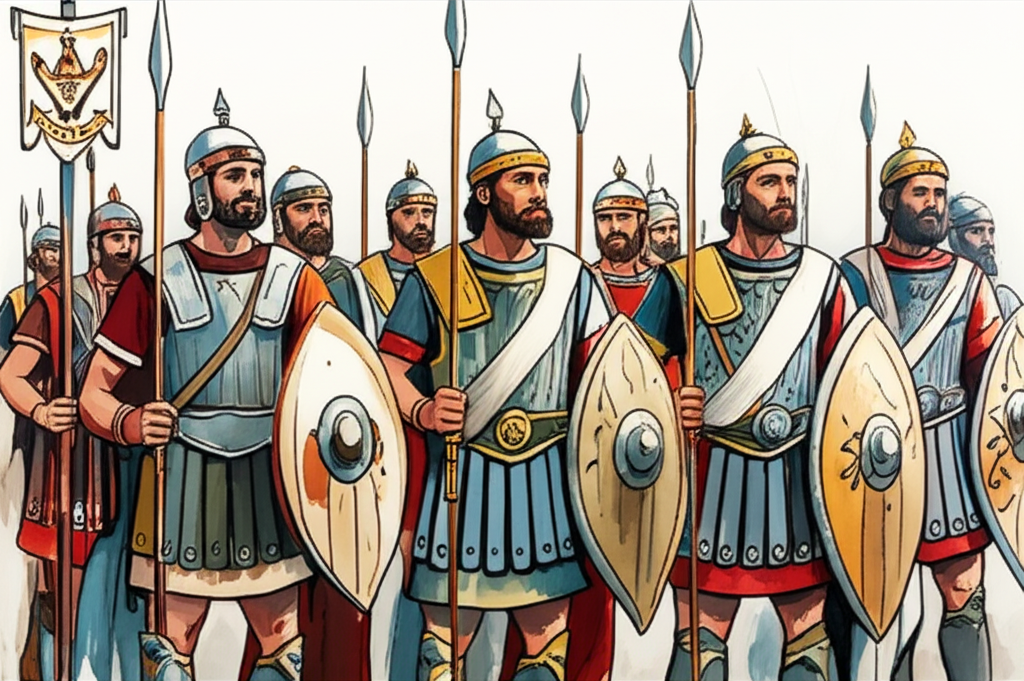
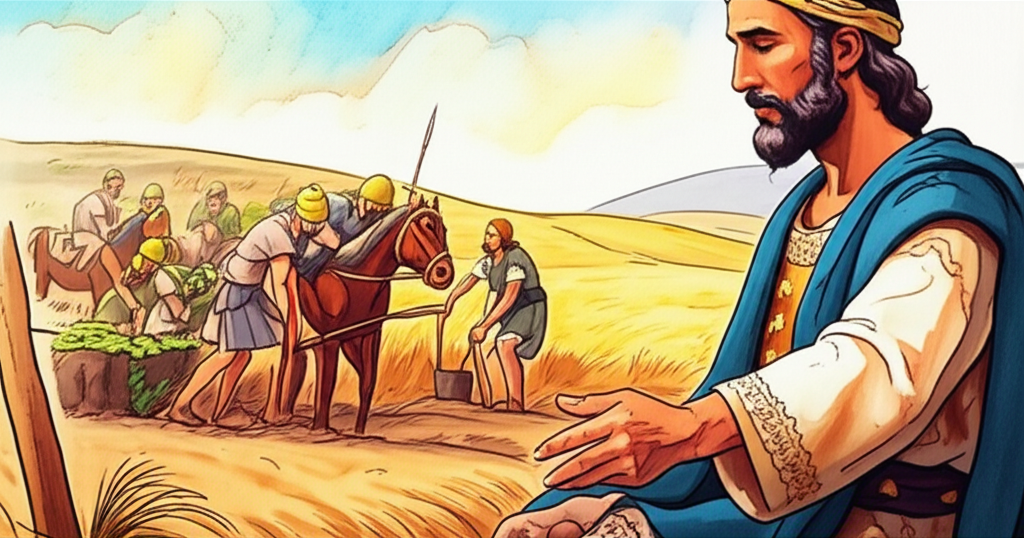
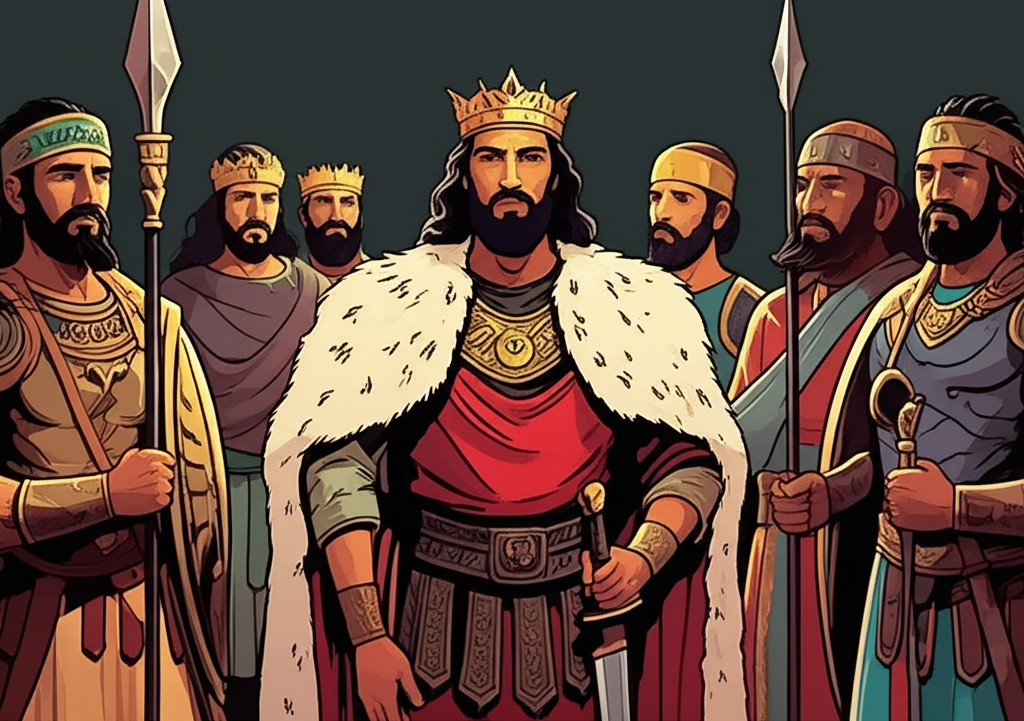
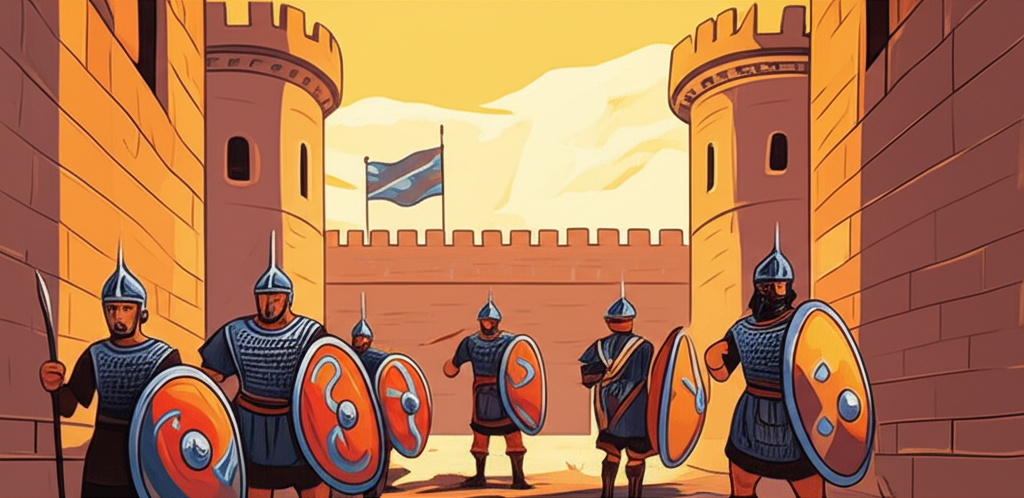
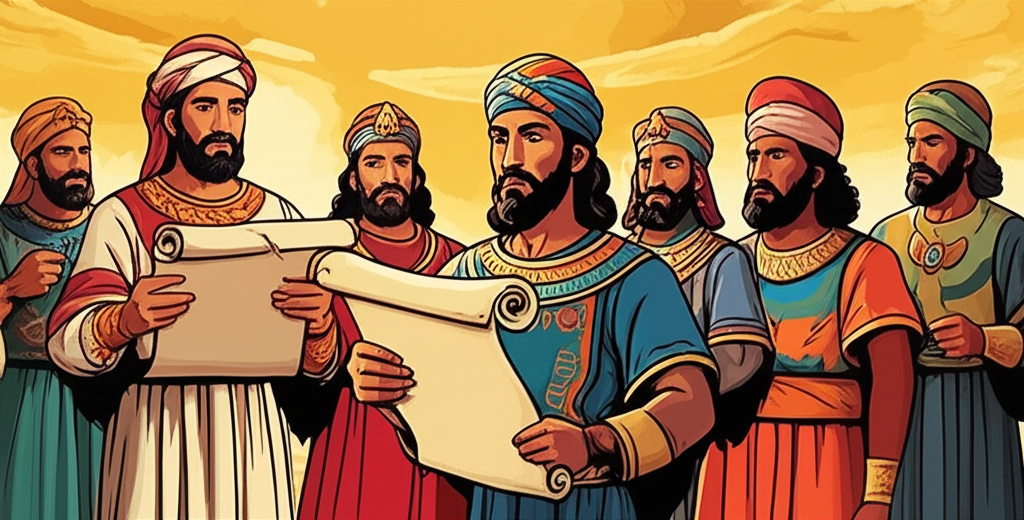
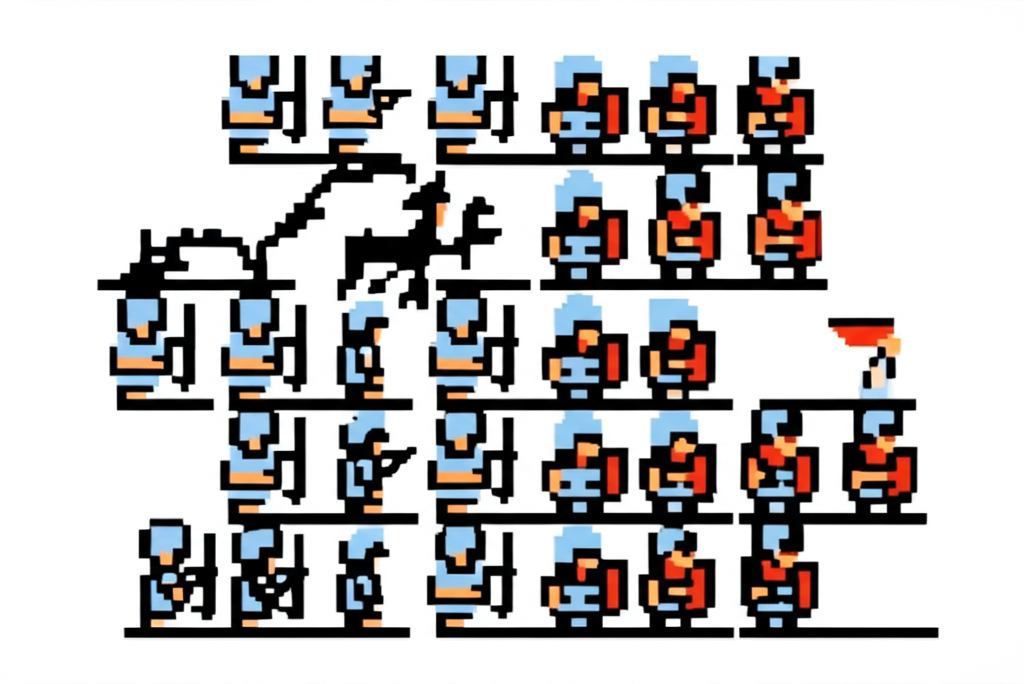
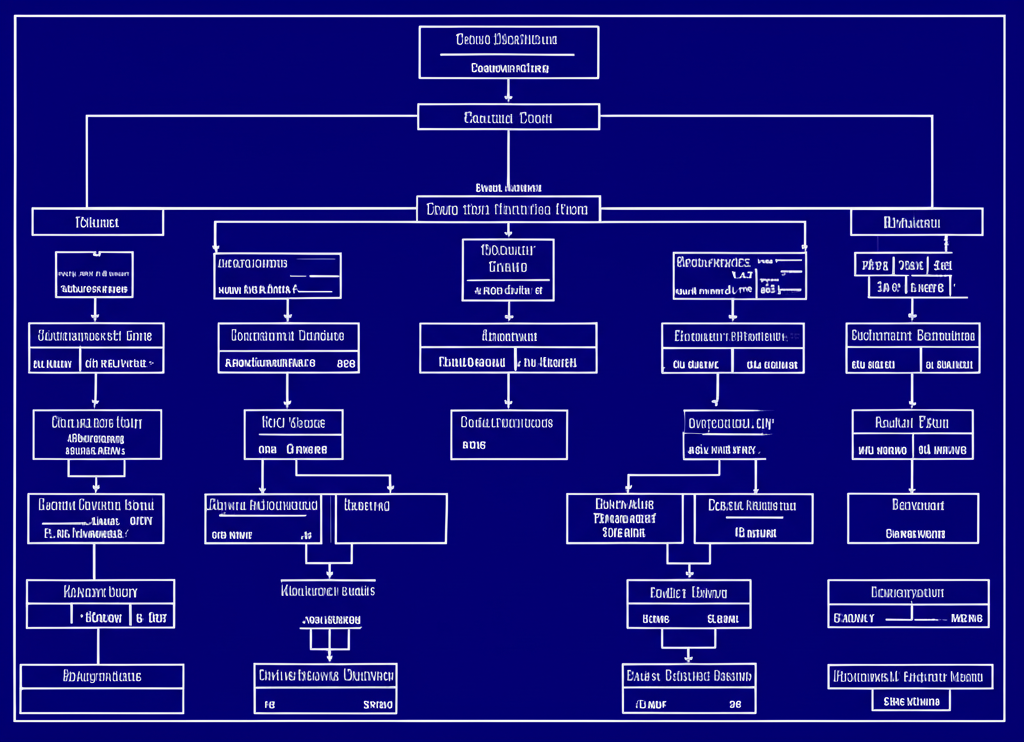
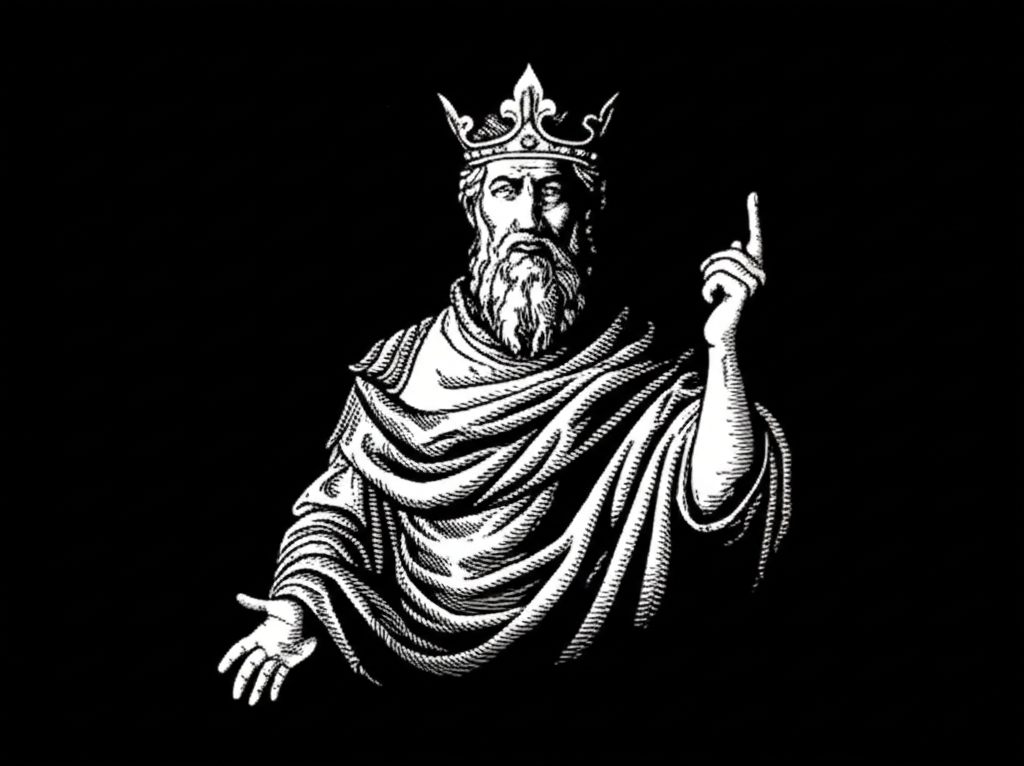
1 Chronicles chapter 27 kjv
- 1 Now the children of Israel after their number, to wit, the chief fathers and captains of thousands and hundreds, and their officers that served the king in any matter of the courses, which came in and went out month by month throughout all the months of the year, of every course were twenty and four thousand.
- 2 Over the first course for the first month was Jashobeam the son of Zabdiel: and in his course were twenty and four thousand.
- 3 Of the children of Perez was the chief of all the captains of the host for the first month.
- 4 And over the course of the second month was Dodai an Ahohite, and of his course was Mikloth also the ruler: in his course likewise were twenty and four thousand.
- 5 The third captain of the host for the third month was Benaiah the son of Jehoiada, a chief priest: and in his course were twenty and four thousand.
- 6 This is that Benaiah, who was mighty among the thirty, and above the thirty: and in his course was Ammizabad his son.
- 7 The fourth captain for the fourth month was Asahel the brother of Joab, and Zebadiah his son after him: and in his course were twenty and four thousand.
- 8 The fifth captain for the fifth month was Shamhuth the Izrahite: and in his course were twenty and four thousand.
- 9 The sixth captain for the sixth month was Ira the son of Ikkesh the Tekoite: and in his course were twenty and four thousand.
- 10 The seventh captain for the seventh month was Helez the Pelonite, of the children of Ephraim: and in his course were twenty and four thousand.
- 11 The eighth captain for the eighth month was Sibbecai the Hushathite, of the Zarhites: and in his course were twenty and four thousand.
- 12 The ninth captain for the ninth month was Abiezer the Anetothite, of the Benjamites: and in his course were twenty and four thousand.
- 13 The tenth captain for the tenth month was Maharai the Netophathite, of the Zarhites: and in his course were twenty and four thousand.
- 14 The eleventh captain for the eleventh month was Benaiah the Pirathonite, of the children of Ephraim: and in his course were twenty and four thousand.
- 15 The twelfth captain for the twelfth month was Heldai the Netophathite, of Othniel: and in his course were twenty and four thousand.
- 16 Furthermore over the tribes of Israel: the ruler of the Reubenites was Eliezer the son of Zichri: of the Simeonites, Shephatiah the son of Maachah:
- 17 Of the Levites, Hashabiah the son of Kemuel: of the Aaronites, Zadok:
- 18 Of Judah, Elihu, one of the brethren of David: of Issachar, Omri the son of Michael:
- 19 Of Zebulun, Ishmaiah the son of Obadiah: of Naphtali, Jerimoth the son of Azriel:
- 20 Of the children of Ephraim, Hoshea the son of Azaziah: of the half tribe of Manasseh, Joel the son of Pedaiah:
- 21 Of the half tribe of Manasseh in Gilead, Iddo the son of Zechariah: of Benjamin, Jaasiel the son of Abner:
- 22 Of Dan, Azareel the son of Jeroham. These were the princes of the tribes of Israel.
- 23 But David took not the number of them from twenty years old and under: because the LORD had said he would increase Israel like to the stars of the heavens.
- 24 Joab the son of Zeruiah began to number, but he finished not, because there fell wrath for it against Israel; neither was the number put in the account of the chronicles of king David.
- 25 And over the king's treasures was Azmaveth the son of Adiel: and over the storehouses in the fields, in the cities, and in the villages, and in the castles, was Jehonathan the son of Uzziah:
- 26 And over them that did the work of the field for tillage of the ground was Ezri the son of Chelub:
- 27 And over the vineyards was Shimei the Ramathite: over the increase of the vineyards for the wine cellars was Zabdi the Shiphmite:
- 28 And over the olive trees and the sycamore trees that were in the low plains was Baalhanan the Gederite: and over the cellars of oil was Joash:
- 29 And over the herds that fed in Sharon was Shitrai the Sharonite: and over the herds that were in the valleys was Shaphat the son of Adlai:
- 30 Over the camels also was Obil the Ishmaelite: and over the asses was Jehdeiah the Meronothite:
- 31 And over the flocks was Jaziz the Hagerite. All these were the rulers of the substance which was king David's.
- 32 Also Jonathan David's uncle was a counselor, a wise man, and a scribe: and Jehiel the son of Hachmoni was with the king's sons:
- 33 And Ahithophel was the king's counselor: and Hushai the Archite was the king's companion:
- 34 And after Ahithophel was Jehoiada the son of Benaiah, and Abiathar: and the general of the king's army was Joab.
1 Chronicles chapter 27 nkjv
- 1 And the children of Israel, according to their number, the heads of fathers' houses, the captains of thousands and hundreds and their officers, served the king in every matter of the military divisions. These divisions came in and went out month by month throughout all the months of the year, each division having twenty-four thousand.
- 2 Over the first division for the first month was Jashobeam the son of Zabdiel, and in his division were twenty-four thousand;
- 3 he was of the children of Perez, and the chief of all the captains of the army for the first month.
- 4 Over the division of the second month was Dodai an Ahohite, and of his division Mikloth also was the leader; in his division were twenty-four thousand.
- 5 The third captain of the army for the third month was Benaiah, the son of Jehoiada the priest, who was chief; in his division were twenty-four thousand.
- 6 This was the Benaiah who was mighty among the thirty, and was over the thirty; in his division was Ammizabad his son.
- 7 The fourth captain for the fourth month was Asahel the brother of Joab, and Zebadiah his son after him; in his division were twenty-four thousand.
- 8 The fifth captain for the fifth month was Shamhuth the Izrahite; in his division were twenty-four thousand.
- 9 The sixth captain for the sixth month was Ira the son of Ikkesh the Tekoite; in his division were twenty-four thousand.
- 10 The seventh captain for the seventh month was Helez the Pelonite, of the children of Ephraim; in his division were twenty-four thousand.
- 11 The eighth captain for the eighth month was Sibbechai the Hushathite, of the Zarhites; in his division were twenty-four thousand.
- 12 The ninth captain for the ninth month was Abiezer the Anathothite, of the Benjamites; in his division were twenty-four thousand.
- 13 The tenth captain for the tenth month was Maharai the Netophathite, of the Zarhites; in his division were twenty-four thousand.
- 14 The eleventh captain for the eleventh month was Benaiah the Pirathonite, of the children of Ephraim; in his division were twenty-four thousand.
- 15 The twelfth captain for the twelfth month was Heldai the Netophathite, of Othniel; in his division were twenty-four thousand.
- 16 Furthermore, over the tribes of Israel: the officer over the Reubenites was Eliezer the son of Zichri; over the Simeonites, Shephatiah the son of Maachah;
- 17 over the Levites, Hashabiah the son of Kemuel; over the Aaronites, Zadok;
- 18 over Judah, Elihu, one of David's brothers; over Issachar, Omri the son of Michael;
- 19 over Zebulun, Ishmaiah the son of Obadiah; over Naphtali, Jerimoth the son of Azriel;
- 20 over the children of Ephraim, Hoshea the son of Azaziah; over the half-tribe of Manasseh, Joel the son of Pedaiah;
- 21 over the half?tribe of Manasseh in Gilead, Iddo the son of Zechariah; over Benjamin, Jaasiel the son of Abner;
- 22 over Dan, Azarel the son of Jeroham. These were the leaders of the tribes of Israel.
- 23 But David did not take the number of those twenty years old and under, because the LORD had said He would multiply Israel like the stars of the heavens.
- 24 Joab the son of Zeruiah began a census, but he did not finish, for wrath came upon Israel because of this census; nor was the number recorded in the account of the chronicles of King David.
- 25 And Azmaveth the son of Adiel was over the king's treasuries; and Jehonathan the son of Uzziah was over the storehouses in the field, in the cities, in the villages, and in the fortresses.
- 26 Ezri the son of Chelub was over those who did the work of the field for tilling the ground.
- 27 And Shimei the Ramathite was over the vineyards, and Zabdi the Shiphmite was over the produce of the vineyards for the supply of wine.
- 28 Baal-Hanan the Gederite was over the olive trees and the sycamore trees that were in the lowlands, and Joash was over the store of oil.
- 29 And Shitrai the Sharonite was over the herds that fed in Sharon, and Shaphat the son of Adlai was over the herds that were in the valleys.
- 30 Obil the Ishmaelite was over the camels, Jehdeiah the Meronothite was over the donkeys,
- 31 and Jaziz the Hagrite was over the flocks. All these were the officials over King David's property.
- 32 Also Jehonathan, David's uncle, was a counselor, a wise man, and a scribe; and Jehiel the son of Hachmoni was with the king's sons.
- 33 Ahithophel was the king's counselor, and Hushai the Archite was the king's companion.
- 34 After Ahithophel was Jehoiada the son of Benaiah, then Abiathar. And the general of the king's army was Joab.
1 Chronicles chapter 27 niv
- 1 This is the list of the Israelites?heads of families, commanders of thousands and commanders of hundreds, and their officers, who served the king in all that concerned the army divisions that were on duty month by month throughout the year. Each division consisted of 24,000 men.
- 2 In charge of the first division, for the first month, was Jashobeam son of Zabdiel. There were 24,000 men in his division.
- 3 He was a descendant of Perez and chief of all the army officers for the first month.
- 4 In charge of the division for the second month was Dodai the Ahohite; Mikloth was the leader of his division. There were 24,000 men in his division.
- 5 The third army commander, for the third month, was Benaiah son of Jehoiada the priest. He was chief and there were 24,000 men in his division.
- 6 This was the Benaiah who was a mighty warrior among the Thirty and was over the Thirty. His son Ammizabad was in charge of his division.
- 7 The fourth, for the fourth month, was Asahel the brother of Joab; his son Zebadiah was his successor. There were 24,000 men in his division.
- 8 The fifth, for the fifth month, was the commander Shamhuth the Izrahite. There were 24,000 men in his division.
- 9 The sixth, for the sixth month, was Ira the son of Ikkesh the Tekoite. There were 24,000 men in his division.
- 10 The seventh, for the seventh month, was Helez the Pelonite, an Ephraimite. There were 24,000 men in his division.
- 11 The eighth, for the eighth month, was Sibbekai the Hushathite, a Zerahite. There were 24,000 men in his division.
- 12 The ninth, for the ninth month, was Abiezer the Anathothite, a Benjamite. There were 24,000 men in his division.
- 13 The tenth, for the tenth month, was Maharai the Netophathite, a Zerahite. There were 24,000 men in his division.
- 14 The eleventh, for the eleventh month, was Benaiah the Pirathonite, an Ephraimite. There were 24,000 men in his division.
- 15 The twelfth, for the twelfth month, was Heldai the Netophathite, from the family of Othniel. There were 24,000 men in his division.
- 16 The leaders of the tribes of Israel: over the Reubenites: Eliezer son of Zikri; over the Simeonites: Shephatiah son of Maakah;
- 17 over Levi: Hashabiah son of Kemuel; over Aaron: Zadok;
- 18 over Judah: Elihu, a brother of David; over Issachar: Omri son of Michael;
- 19 over Zebulun: Ishmaiah son of Obadiah; over Naphtali: Jerimoth son of Azriel;
- 20 over the Ephraimites: Hoshea son of Azaziah; over half the tribe of Manasseh: Joel son of Pedaiah;
- 21 over the half-tribe of Manasseh in Gilead: Iddo son of Zechariah; over Benjamin: Jaasiel son of Abner;
- 22 over Dan: Azarel son of Jeroham. These were the leaders of the tribes of Israel.
- 23 David did not take the number of the men twenty years old or less, because the LORD had promised to make Israel as numerous as the stars in the sky.
- 24 Joab son of Zeruiah began to count the men but did not finish. God's wrath came on Israel on account of this numbering, and the number was not entered in the book of the annals of King David.
- 25 Azmaveth son of Adiel was in charge of the royal storehouses. Jonathan son of Uzziah was in charge of the storehouses in the outlying districts, in the towns, the villages and the watchtowers.
- 26 Ezri son of Kelub was in charge of the workers who farmed the land.
- 27 Shimei the Ramathite was in charge of the vineyards. Zabdi the Shiphmite was in charge of the produce of the vineyards for the wine vats.
- 28 Baal-Hanan the Gederite was in charge of the olive and sycamore-fig trees in the western foothills. Joash was in charge of the supplies of olive oil.
- 29 Shitrai the Sharonite was in charge of the herds grazing in Sharon. Shaphat son of Adlai was in charge of the herds in the valleys.
- 30 Obil the Ishmaelite was in charge of the camels. Jehdeiah the Meronothite was in charge of the donkeys.
- 31 Jaziz the Hagrite was in charge of the flocks. All these were the officials in charge of King David's property.
- 32 Jonathan, David's uncle, was a counselor, a man of insight and a scribe. Jehiel son of Hakmoni took care of the king's sons.
- 33 Ahithophel was the king's counselor. Hushai the Arkite was the king's confidant.
- 34 Ahithophel was succeeded by Jehoiada son of Benaiah and by Abiathar. Joab was the commander of the royal army.
1 Chronicles chapter 27 esv
- 1 This is the number of the people of Israel, the heads of fathers' houses, the commanders of thousands and hundreds, and their officers who served the king in all matters concerning the divisions that came and went, month after month throughout the year, each division numbering 24,000:
- 2 Jashobeam the son of Zabdiel was in charge of the first division in the first month; in his division were 24,000.
- 3 He was a descendant of Perez and was chief of all the commanders. He served for the first month.
- 4 Dodai the Ahohite was in charge of the division of the second month; in his division were 24,000.
- 5 The third commander, for the third month, was Benaiah, the son of Jehoiada the chief priest; in his division were 24,000.
- 6 This is the Benaiah who was a mighty man of the thirty and in command of the thirty; Ammizabad his son was in charge of his division.
- 7 Asahel the brother of Joab was fourth, for the fourth month, and his son Zebadiah after him; in his division were 24,000.
- 8 The fifth commander, for the fifth month, was Shamhuth the Izrahite; in his division were 24,000.
- 9 Sixth, for the sixth month, was Ira, the son of Ikkesh the Tekoite; in his division were 24,000.
- 10 Seventh, for the seventh month, was Helez the Pelonite, of the sons of Ephraim; in his division were 24,000.
- 11 Eighth, for the eighth month, was Sibbecai the Hushathite, of the Zerahites; in his division were 24,000.
- 12 Ninth, for the ninth month, was Abiezer of Anathoth, a Benjaminite; in his division were 24,000.
- 13 Tenth, for the tenth month, was Maharai of Netophah, of the Zerahites; in his division were 24,000.
- 14 Eleventh, for the eleventh month, was Benaiah of Pirathon, of the sons of Ephraim; in his division were 24,000.
- 15 Twelfth, for the twelfth month, was Heldai the Netophathite, of Othniel; in his division were 24,000.
- 16 Over the tribes of Israel, for the Reubenites, Eliezer the son of Zichri was chief officer; for the Simeonites, Shephatiah the son of Maacah;
- 17 for Levi, Hashabiah the son of Kemuel; for Aaron, Zadok;
- 18 for Judah, Elihu, one of David's brothers; for Issachar, Omri the son of Michael;
- 19 for Zebulun, Ishmaiah the son of Obadiah; for Naphtali, Jeremoth the son of Azriel;
- 20 for the Ephraimites, Hoshea the son of Azaziah; for the half-tribe of Manasseh, Joel the son of Pedaiah;
- 21 for the half-tribe of Manasseh in Gilead, Iddo the son of Zechariah; for Benjamin, Jaasiel the son of Abner;
- 22 for Dan, Azarel the son of Jeroham. These were the leaders of the tribes of Israel.
- 23 David did not count those below twenty years of age, for the LORD had promised to make Israel as many as the stars of heaven.
- 24 Joab the son of Zeruiah began to count, but did not finish. Yet wrath came upon Israel for this, and the number was not entered in the chronicles of King David.
- 25 Over the king's treasuries was Azmaveth the son of Adiel; and over the treasuries in the country, in the cities, in the villages, and in the towers, was Jonathan the son of Uzziah;
- 26 and over those who did the work of the field for tilling the soil was Ezri the son of Chelub;
- 27 and over the vineyards was Shimei the Ramathite; and over the produce of the vineyards for the wine cellars was Zabdi the Shiphmite.
- 28 Over the olive and sycamore trees in the Shephelah was Baal-hanan the Gederite; and over the stores of oil was Joash.
- 29 Over the herds that pastured in Sharon was Shitrai the Sharonite; over the herds in the valleys was Shaphat the son of Adlai.
- 30 Over the camels was Obil the Ishmaelite; and over the donkeys was Jehdeiah the Meronothite. Over the flocks was Jaziz the Hagrite.
- 31 All these were stewards of King David's property.
- 32 Jonathan, David's uncle, was a counselor, being a man of understanding and a scribe. He and Jehiel the son of Hachmoni attended the king's sons.
- 33 Ahithophel was the king's counselor, and Hushai the Archite was the king's friend.
- 34 Ahithophel was succeeded by Jehoiada the son of Benaiah, and Abiathar. Joab was commander of the king's army.
1 Chronicles chapter 27 nlt
- 1 This is the list of Israelite generals and captains, and their officers, who served the king by supervising the army divisions that were on duty each month of the year. Each division served for one month and had 24,000 troops.
- 2 Jashobeam son of Zabdiel was commander of the first division of 24,000 troops, which was on duty during the first month.
- 3 He was a descendant of Perez and was in charge of all the army officers for the first month.
- 4 Dodai, a descendant of Ahoah, was commander of the second division of 24,000 troops, which was on duty during the second month. Mikloth was his chief officer.
- 5 Benaiah son of Jehoiada the priest was commander of the third division of 24,000 troops, which was on duty during the third month.
- 6 This was the Benaiah who commanded David's elite military group known as the Thirty. His son Ammizabad was his chief officer.
- 7 Asahel, the brother of Joab, was commander of the fourth division of 24,000 troops, which was on duty during the fourth month. Asahel was succeeded by his son Zebadiah.
- 8 Shammah the Izrahite was commander of the fifth division of 24,000 troops, which was on duty during the fifth month.
- 9 Ira son of Ikkesh from Tekoa was commander of the sixth division of 24,000 troops, which was on duty during the sixth month.
- 10 Helez, a descendant of Ephraim from Pelon, was commander of the seventh division of 24,000 troops, which was on duty during the seventh month.
- 11 Sibbecai, a descendant of Zerah from Hushah, was commander of the eighth division of 24,000 troops, which was on duty during the eighth month.
- 12 Abiezer from Anathoth in the territory of Benjamin was commander of the ninth division of 24,000 troops, which was on duty during the ninth month.
- 13 Maharai, a descendant of Zerah from Netophah, was commander of the tenth division of 24,000 troops, which was on duty during the tenth month.
- 14 Benaiah from Pirathon in Ephraim was commander of the eleventh division of 24,000 troops, which was on duty during the eleventh month.
- 15 Heled, a descendant of Othniel from Netophah, was commander of the twelfth division of 24,000 troops, which was on duty during the twelfth month.
- 16 The following were the tribes of Israel and their leaders: Tribe ? Leader
Reuben ? Eliezer son of Zicri
Simeon ? Shephatiah son of Maacah - 17 Levi ? Hashabiah son of Kemuel
Aaron (the priests) ? Zadok - 18 Judah ? Elihu (a brother of David)
Issachar ? Omri son of Michael - 19 Zebulun ? Ishmaiah son of Obadiah
Naphtali ? Jeremoth son of Azriel - 20 Ephraim ? Hoshea son of Azaziah
Manasseh (west) ? Joel son of Pedaiah - 21 Manasseh in Gilead (east) ? Iddo son of Zechariah
Benjamin ? Jaasiel son of Abner - 22 Dan ? Azarel son of Jeroham
These were the leaders of the tribes of Israel. - 23 When David took his census, he did not count those who were younger than twenty years of age, because the LORD had promised to make the Israelites as numerous as the stars in heaven.
- 24 Joab son of Zeruiah began the census but never finished it because the anger of God fell on Israel. The total number was never recorded in King David's official records.
- 25 Azmaveth son of Adiel was in charge of the palace treasuries. Jonathan son of Uzziah was in charge of the regional treasuries throughout the towns, villages, and fortresses of Israel.
- 26 Ezri son of Kelub was in charge of the field workers who farmed the king's lands.
- 27 Shimei from Ramah was in charge of the king's vineyards. Zabdi from Shepham was responsible for the grapes and the supplies of wine.
- 28 Baal-hanan from Geder was in charge of the king's olive groves and sycamore-fig trees in the foothills of Judah. Joash was responsible for the supplies of olive oil.
- 29 Shitrai from Sharon was in charge of the cattle on the Sharon Plain. Shaphat son of Adlai was responsible for the cattle in the valleys.
- 30 Obil the Ishmaelite was in charge of the camels. Jehdeiah from Meronoth was in charge of the donkeys.
- 31 Jaziz the Hagrite was in charge of the king's flocks of sheep and goats. All these officials were overseers of King David's property.
- 32 Jonathan, David's uncle, was a wise counselor to the king, a man of great insight, and a scribe. Jehiel the Hacmonite was responsible for teaching the king's sons.
- 33 Ahithophel was the royal adviser. Hushai the Arkite was the king's friend.
- 34 Ahithophel was succeeded by Jehoiada son of Benaiah and by Abiathar. Joab was commander of the king's army.
- Bible Book of 1 Chronicles
- 1 Adam to Noah and Abraham
- 2 Lineage of King David Tribe of Judah
- 3 King David Children
- 4 Descendants of Judah
- 5 Descendants of Reuben
- 6 Sons of Levi The Priestly Line
- 7 Descendants of Issachar
- 8 A Genealogy of Saul
- 9 A Genealogy of the Returned Exiles
- 10 The Death of King Saul
- 11 David Anointed King
- 12 The Mighty Men Join David
- 13 The Ark Brought from Kiriath-Jearim
- 14 David's Wives and Children
- 15 The Ark Brought to Jerusalem
- 16 The Ark Placed in a Tent
- 17 The Lord's Covenant with David
- 18 David Defeats His Enemies
- 19 The Ammonites Disgrace David's Men
- 20 The Capture of Rabbah
- 21 David's Census Brings Pestilence
- 22 David Prepares for Temple Building
- 23 David Organizes the Levites
- 24 24 Courses of Priests
- 25 David Organizes the Musicians
- 26 Divisions of the Gatekeepers
- 27 Military Divisions
- 28 David's Charge to Israel
- 29 Offerings for the Temple